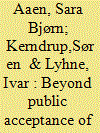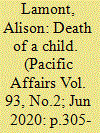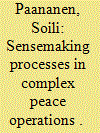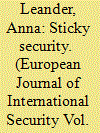| Srl | Item |
| 1 |
ID:
149992


|
|
|
|
|
| Summary/Abstract |
This article adds to the growing insight into public acceptance by presenting a novel approach to how citizens make sense of new energy infrastructure. We claim that to understand public acceptance, we need to go beyond the current thinking of citizens framed as passive respondents to proposed projects, and instead view infrastructure projects as enacted by citizens in their local settings. We propose a combination of sensemaking theory and actor–network theory that allows insight into how citizens enact entities from experiences and surroundings in order to create meaning and form a reaction to new infrastructure projects. Empirically, we analyze how four citizens make sense of an electricity cable project through a conversation process with a representative from the infrastructure developer. Interestingly, the formal participation process and the materiality of the cable play minor roles in citizens' sensemaking process. We conclude that insight into the way citizens are making sense of energy infrastructure processes can improve and help to overcome shortcomings in the current thinking about public acceptance and public participation.
|
|
|
|
|
|
|
|
|
|
|
|
|
|
|
|
| 2 |
ID:
171720


|
|
|
|
|
| Summary/Abstract |
Within the institution of family welfare in the People's Republic of China, the role of the child as future caregiver is so deeply institutionalized as to be almost invisible to policy makers and family members. This article explores institutional responses to the death of a child after the 2008 Wenchuan earthquake to demonstrate how this taken-for-grantedness of the child caregiver role has opened up bereaved parents to social risk, and how actors must perform institutional work to "repair the breach" of the loss of a child in a family. Findings show that after the 2008 Wenchuan earthquake, policy actors took steps to manipulate entrenched family welfare resources, including the population and family planning regulations, to enable bereaved parents to have another child. In so doing, they sought to patch and restore meaning to the family welfare institution, enabling it to continue autopoiesis and resist institutional change in the face of exogenous shock. Use of policy and the positive representation of the policy outcomes in the state-led media enabled sensegiving to be imbued into an otherwise emotionally conflicted decision to try to conceive again soon after the loss of a child.
|
|
|
|
|
|
|
|
|
|
|
|
|
|
|
|
| 3 |
ID:
181419


|
|
|
|
|
| Summary/Abstract |
This article examines sensemaking in complex peace operations. The article’s key argument is that adaptation to ‘the local’ and its complexity requires sensemaking, and that sensemaking helps to disrupt conflict dynamism and prevent conflicts. The study’s theoretical underpinnings are linked to the concept of sensemaking and its further development. The findings are based on eleven in-depth interviews with commanders who have concrete command experience in peace operations. The research findings describe four processes – sensegiving, sensebreaking, sensedrawing and sensekeeping – that are part of the sensemaking entity. Each process entails practices in which sense is embedded, negotiated and regenerated to be shared, in order to work with change, adapt to local necessities and sustain peace. Theoretically, the article contributes to the existing understanding of complex, ongoing and longstanding crises in general and adaptive and proactive sensemaking, in which ‘the local’ is emphasized, in particular.
|
|
|
|
|
|
|
|
|
|
|
|
|
|
|
|
| 4 |
ID:
169163


|
|
|
|
|
| Summary/Abstract |
In security studies and beyond, technological developments are associated with technocratic, rationalistic, transparent forms of security governed from a distance. In much of the advertising of tracking devices the associations made are very different not to say opposed to this. The advertising composes security anchored in sensemaking and resonance rather than calculus and reason, working from within and below rather than from a above at distance and depending on the negotiation of opaque co-presences rather than the establishment of precision and transparency. The consequence is that advertising not only extends but also deepens the grip of military/security matters: making them sticky. Moreover, the heterogeneity of the elements is such that what is composed is a shifting collage rather than a stable composition. This argument makes a threefold contribution to security studies: a theoretical reconceptualisation of what it means to compose security, an empirical intervention in the debates surrounding the politics of tracking devices and a methodological intervention in favour of collaborationist research strategies.
|
|
|
|
|
|
|
|
|
|
|
|
|
|
|
|